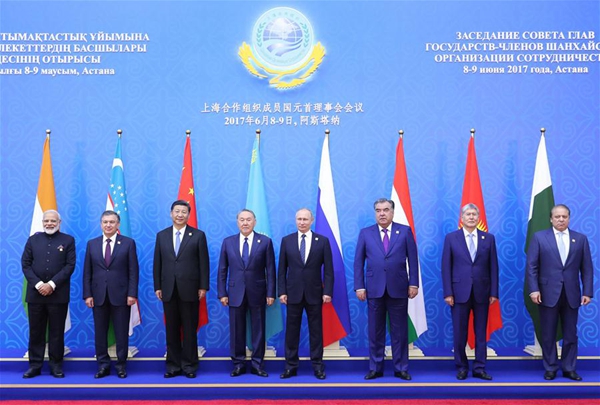SCO a game-changer for South Asia
- By Sabena Siddiqui
 0 Comment(s)
0 Comment(s) Print
Print E-mail China.org.cn, June 12, 2017
E-mail China.org.cn, June 12, 2017
 |
|
Chinese President Xi Jinping (3rd L), leaders of other Shanghai Cooperation Organization (SCO) member states and prime ministers of India and Pakistan pose for a group photo during the 17th meeting of Council of Heads of State of the Shanghai Cooperation Organization (SCO) in Astana, Kazakhstan, June 9, 2017. [Photo/Xinhua] |
At this year's summit of the Shanghai Cooperation Organization, South Asian neighbors India and Pakistan were formally inducted as members by President Xi Jinping.
Xi declared, "Firmly committed to the Shanghai Spirit, SCO member states are making solid progress in building a community of shared future, thus establishing a fine example of the new type of international relations featuring win-win cooperation. In this context, today we are going to admit India and Pakistan as new member states of the SCO."
Geographically, SCO now represents three-fifths of Eurasia and provides an umbrella for half the world's population. Starting out in 1996 as the "Shanghai Five," today SCO members are also linked with the Belt and Road Initiative, a global mega-project.
Recently, there has been concern that including India and Pakistan will prove counter-productive, as they are regarded as bringing them the baggage of decades-old grudges; still there is no reason why past issues cannot be resolved. In the past, SCO has managed differences between members through dialogue, so it has the dynamics and the experience.
The SCO platform brings India and Pakistan closer in accordance with the "Shanghai Spirit." While the resolution of bilateral issues may take a while, but membership of the SCO is a significant game-changer for South Asia.
As observed by Professor Zhang Li, director of Sichuan University's Center of Afghan and Regional Security Studies, "The SCO will undoubtedly help India and Pakistan narrow their differences in perceiving [their mutual interest in] some important regional issues, including terrorism, border management and physical connectivity […] increasing mutual trust and even reconciling their respective policy approaches to regional security challenges."
At the very least, adherence to the SCO Charter will bind both nations. Article 1, for example, states the main goals as being to jointly counter separatism and terrorism in all manifestations, enhance regional cooperation in politics, trade, economy and defense, as well as working together to prevent international conflicts and achieve their peaceful settlement.
Meanwhile, Article 2 specifies adherence to the basic principles of mutual respect of sovereignty, independence and territorial integrity and inviolability of borders, observing non-aggression, non-interference in internal affairs, abstaining from the use of force or threats in international relations, non-pursuance of unilateral military superiority in adjacent areas; working towards peaceful settlement of disputes between the members; implementing the obligations mentioned in the Charter and other documents adopted within the framework of SCO.
Not only that, members have to mutually agree to reduce their armed forces in border areas to gain mutual trust; thus, the SCO Charter is the key to solving longstanding hostility between the two South Asian powers through dialogue and confidence-building measures.
Chinese foreign ministry spokesperson Hua Chunying has already stated, "[We] hope India and Pakistan strictly follow the charter of the SCO and the idea of good neighborliness, uphold the SCO spirit, improve their relations and inject new impetus to the [organization's] development."
Another area of concern is terrorism that most countries now face in some form; hence, there is room for security pacts, joint counter-terrorism, exchange of intelligence, joint military drills and exercises under SCO auspices. Having said that, it is not visualized as a "military bloc" for now, as the group works in adherence to international laws and the UN Charter.
As the Russian President Vladimir Putin said at the summit: "The role of the regional anti-terrorist structure of the SCO is growing, and an important step in strengthening the legal framework of its activities is the convention on countering extremism." For the record, Pakistan was the very first country outside the original consortium applying for membership, and it also played an intrinsic role in the launching of the Belt and Road Initiative as the flagship trade corridor, the CPEC, runs through the length and breadth of the country and is a major transport route for Central Asian exports.
Pakistan foresees no impediments to furthering the vision and aims of the SCO; instead it is an opportunity to share its expertise in counter-terrorism and participate in military, trade and technical ventures. All this was possible due to mutual trust and the exemplary brotherly relations between China and Pakistan.
At the summit, the next five-year development strategy of the SCO Interbank Consortium (IBC) was formalized to work in tandem with the Silk Road Fund to provide financing and banking services for Belt and Road countries. Welcoming the new members, SCO Secretary-General Rashid Alimov said the expansion would provide greater financial advantages.
"The admission of these two powers, which are respected not only in the region but also the whole world, will certainly strengthen the SCO and broaden its potential and capability. This will also have a positive effect on the SCO IBC, which is an effective instrument of banking, financial and investment cooperation within the Shanghai Cooperation Organization," he said.
Sabena Siddiqui (Twitter: @sabena_siddiqi) is a foreign affairs journalist and lawyer based in Pakistan.
Opinion articles reflect the views of their authors, not necessarily those of China.org.cn.






Go to Forum >>0 Comment(s)